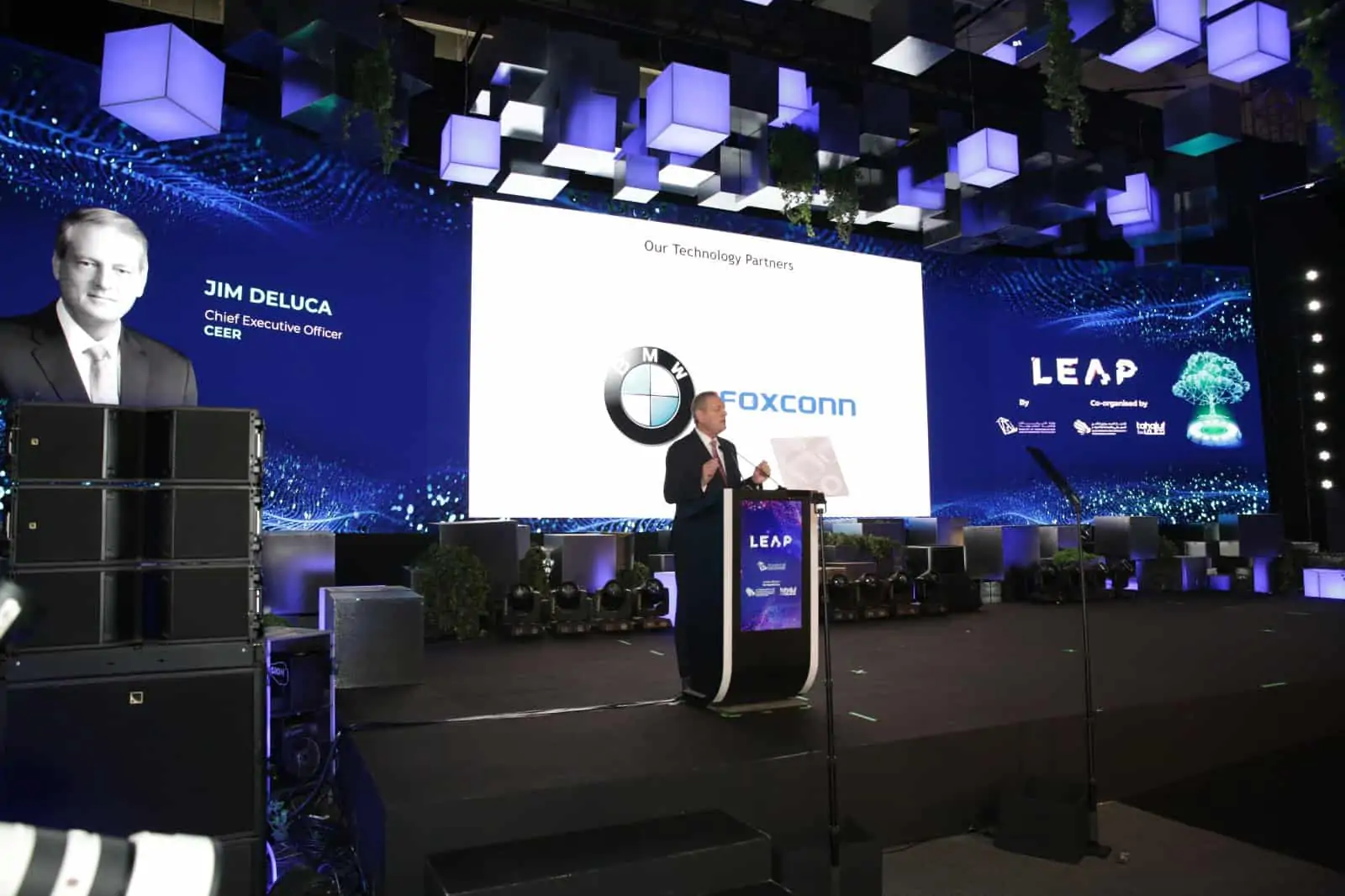



Ceer CEO James DeLuca was recently a main stage speaker as part of the second annual LEAP conference, which took place in Riyadh, Saudi Arabia, from February 6-9, 2023. The event attracted over 170,000 attendees, including leading experts, investors and companies interested in exploring the latest technological innovations. Fitting this year’s theme of ‘Into New Worlds,’ DeLuca spoke about the transformational role that technology is playing in today’s automotive sector and the importance of the Kingdom’s technology expertise in building a pioneering automotive manufacturing hub in Saudi Arabia.
Highlighting how building a state-of-the-art EV manufacturing cluster at King Abdullah Economic City (KAEC) will attract international OEMs (original equipment manufacturers) and tier-one suppliers to the Kingdom, he pointed to how the automotive industry has helped spur advances in technologies such as advanced robotics, 3D printing and Industry 4.0.
This influx of tech and innovation, that will form the basis of the country’s automotive industry, will create tens of thousands of high-tech jobs in the Kingdom, primarily for young Saudi nationals. Turning to specific numbers, DeLuca said the manufacturing hub in KAEC will produce hundreds of thousands of cars per year by 2030, for both the Saudi market and exports. Ceer’s vehicles will feature advanced battery technology specifically adapted to the region.
“We will be using tech to improve the ownership experience as it relates to the region. Think air-conditioning that is designed for our ambient temperatures and a surface finish that will hold up in our harsh environment,” he explained to the LEAP audience.
Throughout DeLuca’s talk, the Ceer chief executive focused on how technology is influencing how cars are designed, validated, manufactured and used. “Many of the jobs that the automotive industry will produce are going to be technology-focused,” he said. “Long-term, we are focused on designing and building ‘Saudi Made’ electric vehicles that are loaded with features – with technology – that will wow consumers in Saudi Arabia and the Gulf.”
Achieving those technological milestones requires strong partnerships to make the vision a reality. DeLuca spoke about how technology partnerships will accelerate the development of electric vehicles, both reducing the time needed to create a car industry whilst also designing and building cars that will impress consumers with their features. He also discussed the importance of the partnership with Foxconn — who are pioneers in the EV space and offer vital support in the development of Ceer vehicles’ electrical architecture. Marking his enthusiasm, he said: “We want to lead in connectivity and infotainment – who better to partner with than Foxconn?”
As the EV manufacturing hub at KAEC grows in size and impact, other vital collaborations with global OEMs will continue to foster a critical drive for innovation. Discussing opportunities to use technology to improve the vehicle development process, DeLuca spoke about how automotive brands can replicate every aspect of how vehicles will function and perform using high-tech software modelling.
“Software is helping automotive OEMs become more agile and faster, so that we can design and test new concepts in shorter periods of time,” he detailed. “KAEC will be one of the most advanced manufacturing complexes in the world.”
Those advanced tools will include smart maintenance, remote assistance and the creation of digital twins allowing engineers and designers to use augmented reality and digital models of physical objects to model changes. Electrical engineering architecture needs to accommodate advances in automated driving, expanded infotainment, and 5G connectivity.
DeLuca concluded his talk by speaking about how technology is changing the automotive experience for consumers, and shared an example of how cars will be integrated with other technologies.
“We want to make it easier and more convenient to control your vehicle,” said DeLuca. The interface between smartphones and EVs is seamless. Ceer cars will become entertainment centers, allowing users the opportunity to enjoy different types of media across a range of screens in the cabin.
“Vehicles will be 5G-enabled, allowing for regular software updates to be pushed to your car, just like you do with your phone.”